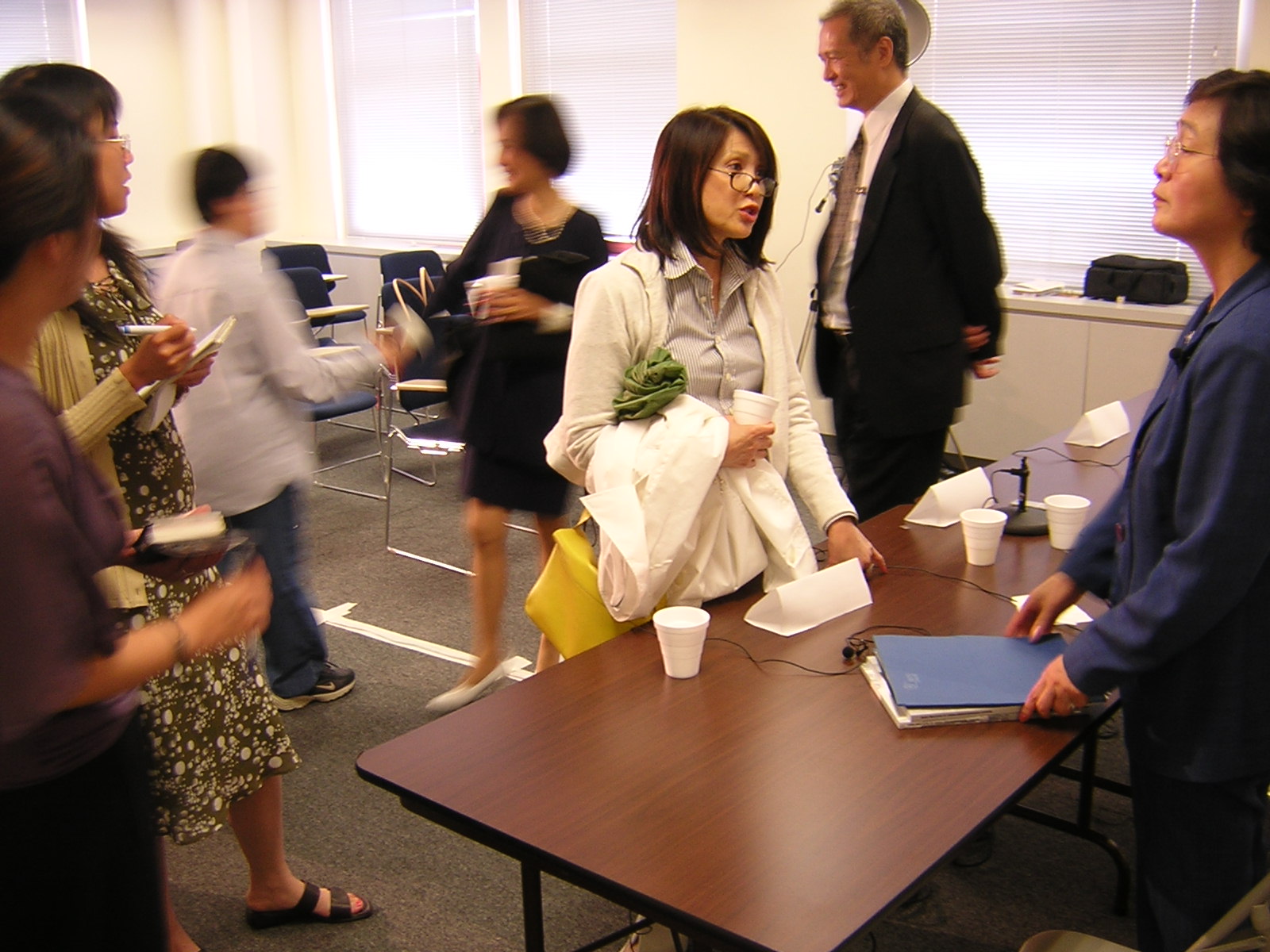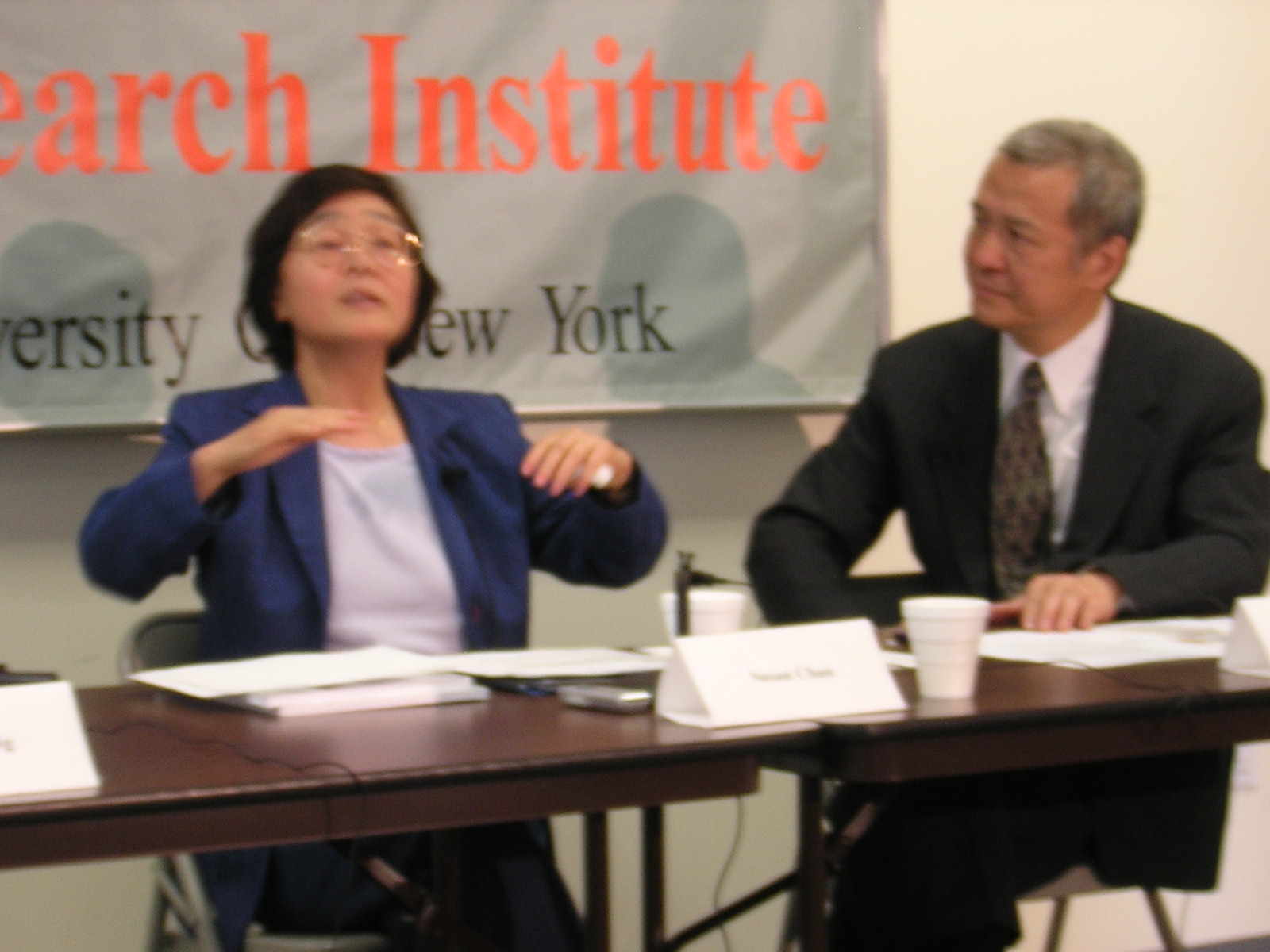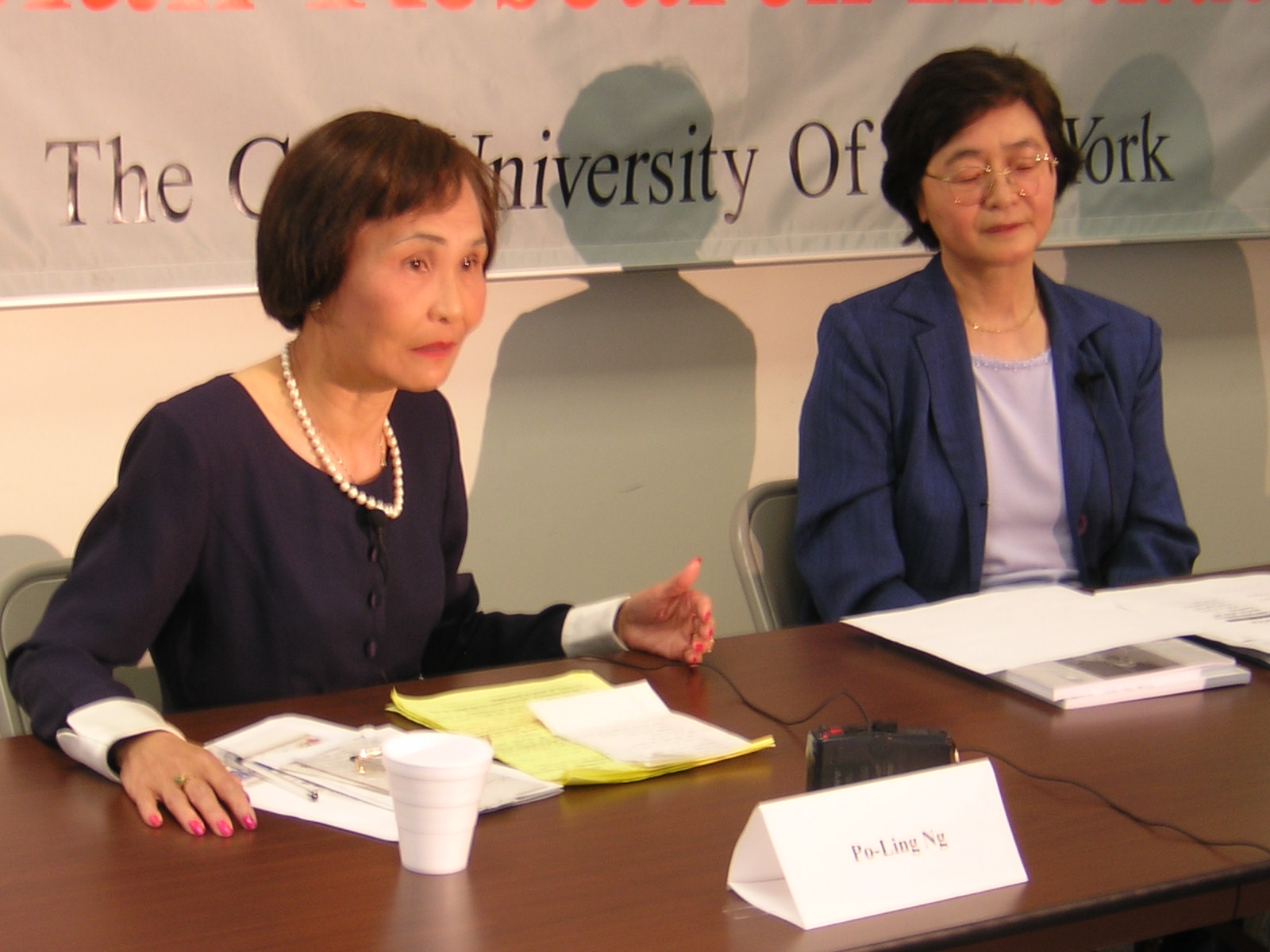
Workshop Schedule
(Eleven Sessions)
Date: March 26; April 2, 16, 23; May 7, 21, 28;
June 4, 11, 18 & 25, 2004
Time: Fridays, 2:00PM to 4:00PM
Place: 25 West 43rd Street, 18th Floor
between 5th & 6th Avenue, Manhattan

Susan Chan: When Tom called me about this workshop, “Chinese family in transition, the new role of women.” It sounded very broad. Just look at China, there’s a tremendous change. I left China in the ‘50s. I went back in the ‘70s. When they introduced me to these women in key positions, I had tears in my eyes. I grew up in China. My grandmother did not have a chance to go to school. She would stand outside the window of the schoolhouse when the teacher was teaching students. That’s how she learned to calculate. She doesn’t write, but she’s remarkable.
My mother had four years of elementary education. When I went to elementary school, I was doing very well, the first one in the class. My grandparents would say, “Oh, you are doing so well, but you are only a girl!”
That was the way Chinese women grew up. In a sense, I’m very lucky to have come to this country. I came here in 1966. I went through hardships and struggles, but I was able to finish school of social work. My passion is to help people. That’s why I worked in Chinatown for over 30 years.
In the United States, Chinese women are doing well. Elaine Chao, secretary of the U.S. Department of Labor, is now holding one of the highest positions in the federal government. What about our Betty Lee Sung? Betty is my role model. I learned a lot from Betty. Having said all these things about Chinese women doing well, I must mention that large populations of Chinese women are struggling. They have to fend for themselves, and cope with the day-to-day living.
Let me relate a real story to you. A Chinese woman was married to a cook ten years ago. It seemed like an average family, but in the ten years of her life, on and off, her husband had repeatedly abused her. She came over here from Hong Kong as a young woman with no family support. After she had a baby, she had to stay home. She wanted to learn English, but her husband was not supportive, fearing that if she learns some English, she would go mainstream and not obey him. She was forced to stay home, and she lived a very isolated life. When she refused to sleep with him, he would beat her up, with bruises all over. She could not really think of leaving her husband because of her son, and she worries that her family in Hong Kong would look at her as a failure that brought shame to the family.”
She endured all these years, until one day her husband tied her down to a chair and hit her. She got really hurt and went to the police. She ended up in a woman’s shelter. When she came to us, we had to help her heal, pick herself up and face life again. In this particular case, the result was successful. She was able to learn English and enrolled in a training program to get a job. Now, she lives in Brooklyn.
Another story is about this woman who was pregnant when she came. She had a child and a husband in China. She came over here in 2000, as a tourist, and then worked. She’s hoping to get asylum in this country. She’s making a living by selling things on the street. If you walk through Chinatown, you can see a lot of people selling phone cards, egg rolls, meatballs and all kind of food.
At the time, she and her baby slept in a tiny room in Chinatown. After September 11th, she no longer could make a living. She couldn’t pay the one room rent. She was evicted, and ended up in a public shelter. What’s she going to do? Unless she gets asylum, she is not going to make it. Think of these Chinese women. We have 100 some cases going through our office every day. If it is a quiet day, maybe only 50 people. We are here talking about how well we are doing. Don’t forget that under the success stories, thousands are not doing so well.
Thomas Tam: Before we go on with your presentation, can we ask Po-Ling to make some opening statements?
Po-Ling Ng: First of all, thank you for inviting me to be one of the panelists regarding the important role of women. Today, I want to share with you two stories.
The first one is about my own life situation. The second is about the Chinese American woman’s important role they should play. I was born in a traditional Chinese family, where women play a subservient role. When she is a child, she should listen to her father. When she marries, she should listen to her husband. When she is old, she should listen to her son.
My father was not so traditional. He said, “Don’t worry, you are my daughter. If you feel happy, your father will feel happy. If you marry a good husband, maybe it’s not necessary to listen to him. When you are old, maybe your sons and grandchildren will respect you, maybe you don’t have to listen to them!” I said, “Yes, father.”
I was born in a rich family. Unfortunately, in 1949 when Mao Tse Tung took over China, our dream broke up. We could not bring anything from China to Hong Kong. Suddenly we are very poor. But my father encouraged me, “Po-Ling, don’t worry about it. I treat sons and daughters the same, with equal opportunity. You are lucky to be born in my family. I am your father.” I said, “Thank you.”
No matter how poor we were, my father focused on his son’s and daughter’s education. When I graduated from high school, I did not have money go into college. No father’s brother was rich and had no children. When my father asked him to support me going to college, what did my uncle answer? “Sorry, if Po-Ling is a son, I would give to him. Unfortunately Po-Ling is a daughter, I don’t want to lend her any money.”
I was lucky. I was able to find work. YMCA gave me a part-time job. Not only could I afford to pay my tuition, I could use part of my earnings to support my family. After I graduated, my father warned me not to marry Toishanese because the men always control, and the woman has no voice.
My grandpa warned me not to marry poor. Unfortunately, I married a very poor Toishanese man. In 1967, when riots broke out in Hong Kong, my brother-in-law applied for us to come to the United States. Later on, I will talk about my situation, and my work experience.
Thomas Tam: Both of you have given us insights about Chinese women in this paternalistic, male-centered society. Recently, within the City University of New York, Chinese female students far outnumbered that of male students. Can either of you talk a little about the reasons behind it?
Susan Chan: Throughout history, women carried babies and gave birth to babies, but they are considered intellectually inferior to men. Since the 20th century, we talk about women with equal rights in government, and legislation with equal opportunity.
Now, women are taking advantage of the opportunity. We don’t have to accept social oppression, and we change the attitude towards our daughters. One way of changing your life is having an education. I think the women made full use of their opportunity.
Po-Ling Ng: Chinese American is a minority, but the Chinese American woman is the minority of the minority. We come here for the American dream. American Dream is really for the freedom, equal opportunities, and challenges. I’m the first generation to come here. I did not bring a lot of money. I tell you, if you don’t get the best education, your American dream cannot come true.
I’ll just give an example. Elaine Chao came from Taiwan; she had a language and cultural problem. Luckily, the family supported her. Now she is the Secretary of the U.S. Labor Department. She always said: “I feel self confident. When I come here, I am not English speaking. When I go to school, I get in a lot of trouble; but my father taught me never to give up, take the challenge, get the best education, then you have a chance.”
Thomas Tam: I want to thank you, Po-Ling, for your very touching comment. As you said, Chinese women are the minority within the minority. When they have a chance to attend the City University of New York where the cost of going to college is must lower, maybe that’s one of the reasons why the admission rate for Chinese women shot up. Now, you have a very understanding father, and the example that you have given, Elaine Chao, has a very good family; but as the family changes, the focus, instead of only on the man, becomes more equal to include women. How is this affecting the family itself? Susan, you talked about family violence, is that related to the changing status of women within the Chinese family?

Susan Chan: In a family, if a woman is financially more independent, if they have more freedom of choice, but the other people within the family are not changing at the same speed, the family will have a lot of tension and conflict. In this country, it seems that women are making better adjustments than the men. Chinese men have a lot more pressure from their family.
Domestic violence is not necessarily caused by social or cultural change. It’s more psychological. If you are in a dull relationship, if both people are mature, they know how to deal with it. If one spouse is less mature, and very impulsive, then violence can happen. Mind you, abusive behavior is not only from husband to wife, it could be the other way around.
Po-Ling Ng: I am a social worker. I have served on the school board for 18 years. Sometimes, a woman would come to me, “I want to divorce my husband.” I said, “Why do you want to divorce? Your children are very important.” They said, “I cannot get along with my husband.” I know that; so that’s why I tell them to make the family happy, in so many words: respect each other, care for each other, and plan to do things together. The wife and husband should learn to share their feelings.
Sometimes, the issues involved more than the couple. A woman complained to me, “My husband is a good man, but he doesn’t like my parents at all.” That’s how the parents also play a very important role for family happiness.
Thomas Tam: The respect that you’re talking about is very important in keeping the family happy. Susan, do you want to continue with your presentation?
Susan Chan: We talk about Chinese family in transition. We’re talking about different stages of acculturation.
Compared to the other population, Chinese have more elderly people staying home with the children. It’s still true that we have the extended family. They may not be living in the same building, but they are very much connected. They are the old immigrants. The new immigrant family came mostly under the Family Reunification Act. They live together, and work from hand to mouth.
The acculturated suburban family could also be an immigrant family, like mine. I came as an adult, worked through many years, had some money, moved outside the community, and bought a little house; that’s the American dream. Then, there is the American born Chinese family. Of these different types of families, the last two are more mainstream. They have made better adjustments in terms of getting the opportunity and developing to the fullest.
As to family problems, very successful people seldom come to see us. Only once in awhile, when they become mentally ill. For the poor couples, everything is disastrous and sad. The majority of people coming to us are the old immigrant couples, and the new immigrant family. They came over here. They are in distress. They need help. They don’t know how to get help. They feel that life is miserable, and they question, “Why am I here? Maybe it was a mistake!”
Thomas Tam: We have talked about how respect within the family is very important. Do you want to comment on that?
Susan Chan: Education is number one in importance, even Confucius said that.
Thomas Tam: So we listen to Confucius?
Susan Chan: Confucius’ teaching has a lot of truth to it, except when Confucius said that women should be subservient. We don’t accept that, but that was five thousand years ago. Now it’s different. Since the liberation in China, Chairman Mao said, “Women hold up half the sky”.
The changes did not take place just because we come over here. Woman’s rights in China have also accomplished a lot. Education is not just the knowledge; it’s also a way of life. An educated person knows how to look at things, and relate to people. His perspectives in life are different. In Asian culture, Chinese culture in particular, education is a very important thing.
Thomas Tam: How does the change from a paternalistic family to a more equal rights basis affect the generation gap?
Susan Chan: I don’t want to dominate the topics…
Po-Ling Ng: No, it’s okay.
Thomas Tam: Why don’t you comment first, and then Po-Ling can comment later?
Susan Chan: We came from an extended family structure. For Americans, the norm is a nuclear family. If you’re an American, under the law, you have no obligation to give a check to your parents every month. If you don’t give in China, you’ll get criticized. It’s still very much an extended family responsibility.
In Chinese family, when you talk to your parents, aunts and uncles, you really have to show your respect. Even if you don’t like them, you still have to be polite. Respect the elderly is an important virtue.
Over here, the relationship is more equal. They say that parents and kids should talk to each other like friends. That’s how you share feelings. That’s a different culture right there.
In America, individuals’ privacy and independence are highly valued in child development. Years ago in Chinatown, many mothers are still carrying their six year old kids to school. On the one hand, you can say that Chinese parents are very nurturing. On the other hand, you can consider that Chinese parents are trying to prolong their kids’ dependency on them. American culture is just different.
Po-Ling Ng: Generation gap is an interesting topic. A lot of people think of generation gap as a language and cultural problem, but if you want to resolve the generation gap, you should know not only the language, but you should also learn the communication skills as well.
When my children come to me with a problem, the first thing is I don’t talk. I listen. That way, I understand their goals and their feelings before I can come up with a good solution. Resolving generation gap also means keeping a good relationship. You cannot achieve that without a genuine respect of one another.

Thomas Tam: You mentioned communication skills. How can that be transmitted to families that may need those skills? By the time they come to a social worker, they’re already in big trouble.
Susan Chan: All this discussion about respect and understanding is fine, but it’s all intellectual. In my work, we’re talking about communication with feelings. A lot of times when we work with the parent-child relationship, we zero-in to the hearing part. There may be built up anger or one of the family members may be very depressed, and they may be suffering from other kinds of problems. Communication is more than just words. Words sometimes lie. The mother says something, but doesn’t mean it. The kid says something that hurts, but he may not see it. That’s why we, as professionals, have a role to play.
Po-Ling Ng: How can we transmit communications skills? Some years ago, Mei-Ying Chen was the president of IS 131 PTA association. They did a wonderful job. They set up many training programs for the parents, students, and teachers all together. They talk about their need and the things that are bothering them. They learned how to resolve their problems.
These training programs transmitted very good communication skills. Children learned how to talk to the parents; the teachers learned how to talk to their students. That was a very successful program. If you want to resolve generation gap problem, communication skill is the key thing.
Susan Chan: We have many successful Chinese women. Since we are doing well in society, we achieve more equality in the family. Now, women have more say about when they will have a child, and how many they want to have. They have more of a voice in the family.
Chinese women are now in many professions. We have a voice, and we play a very important role. We should not forget that there are other women who are struggling, day in, day out, and have a lot of problems.
Even though we have more female students enrolling in college, there are still inadequate educational and training opportunities. I am talking about middle aged people, without opportunities of training.
After September 11th, a lot of people have no jobs. They had manual jobs, factory jobs, restaurant jobs, or selling stuff on sidewalks. They have no skills. The September 11th fund has a beautiful name: One Stop Training Center. You send the people there, and they get three months’ training in English. But what can they learn in three months? After three months, they still cannot get a job. A lot of women are in that situation in our community.
Where is the answer? In our agency, Asian Americans for Equality, we have this small business loan that’s helping a lot of people. They could make a loan with very low interest rate so they could start little shops in Chinatown. In another area, maybe we ought to look for employers outside of Chinatown, in a big store like Gap. We have people who know how to do folding, and other manual jobs. They don’t have to communicate in English if they have a supervisor who can speak Chinese. Okay, you have a team. Looking for a job is really difficult for these people. That’s why there is inadequate opportunity.
If a Chinese work in the mainstream, people still expect you to be timid. If you open your mouth, they will say that you are aggressive; if you argue, they will say, whoa, how come you are so angry? Maybe you think that you are being discriminated against? The stereotype of Chinese woman is that they are timid, nice, and makes no trouble. For young people in the mainstream, there’s a thin line; you want to be assertive, but you don’t want to be labeled as aggressive, as someone trying to rock the boat. The truth is we need those people too. We need people to go out there, rock the boat, and make noise.
Role changes affect a lot of people. In the family, there are tension and conflict due to role changes. An older woman usually enjoyed a lot of respect in our culture. With role changes, the children now assume a lot more power in the family. It’s very hard for the parents to accept, but it’s happening.
In 1995, I went to the UN Women conference in Beijing. They appealed to every government to eliminate discrimination against women. It declared that women are entitled to equal enjoyment and protection of all human rights and freedom in the political, social, cultural, and other arenas.
We are saying that government should have legislation to protect our rights. I used to have one complaint about CCBA, the oldest association in Chinatown. At their board meetings, how come there’re no women there? And the other associations, they’re all guys, where are the women? The only hope is that women should come out and get involved, but we need the help of men. Men and women should work together to achieve equality to all human rights. That will be a happy goal.

Po-Ling Ng: We are lucky because we are living in America where people have more freedom. It is up to you to make the dream come true. If you just sit down and complain: I am the Chinese American woman; I am the minority of minorities; I’ve been discriminated. I tell you, nobody discriminated against you; you discriminated against yourself. You know, challenge is really important.
Crying cannot resolve problems. Go ahead, stand up, and take the challenge!
Look at the successful Chinese American women: Betty Lee Sung is a very good educator and Alice Chen is the principal of Murray Bergtraum. Our judge, Doris Ling-Cohen, born in a poor family, her father worked in the restaurant, and her mother worked in the garment factory, right now, she is New York’s Supreme Court justice. How about Elaine Chao? How about a lot of successful Chinese American women in the different fields? We have the power, we have the dream, because we have a great opportunity in this country.
How could we get there? Very easy. Just talk to the students: If you want to be successful, come to CUNY. The low-income family will have a chance because the tuition is low. If you want your dream to come true, go ahead, accept the challenge, never give up, and don’t sleep until you are successful. It doesn’t matter if you are young or old, it depends on yourself.
Male Speaker: Years ago, the United Nations committee on Human Service went around the countries to promote women’s status. There were countries where women had to cover their faces. They didn’t want to change that practice.
Thomas Tam: Well, that’s always a cultural issue.
Male Speaker: Some traditions are really backward.
Susan Chan: Social change takes time.
Male Speaker: They have to cover their faces, except for the eyes.
Susan Chan: It really takes a lot of years for customs to change. I believe that change is happening. In those countries, women are really oppressed.
Thomas Tam: Things are changing, certainly. I’m really grateful that both panelists can come and talk to us. They are exemplary figures, strong like steel, that can yield, and at the same time, unyielding. That’s what keeps the family and the whole community going.
Transcription Services Provided by Transcendent International
Transcripts
Chinatown and the New York Political Landscape
The Future of Chinese Americans
Local Business and Development

This workshop series is dedicated to Professor Betty Lee Sung, in celebration of her 80th birthday. Professor Sung is a pioneering scholar and activist on issues related to the Asian American community. She is one of the founders of Asian American Higher Education Council (AAHEC), and Asian American / Asian Research Institute (AAARI).
